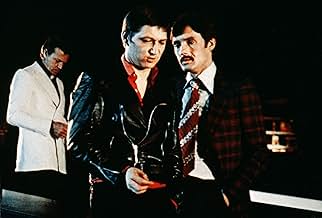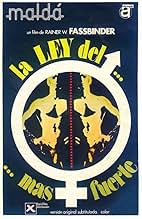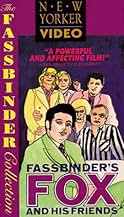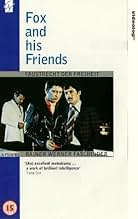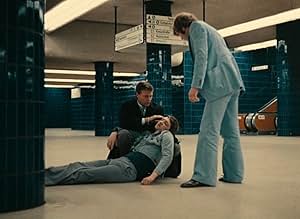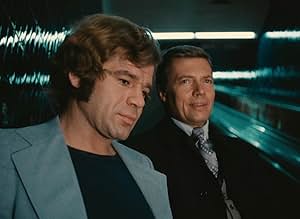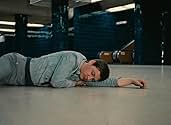IMDb RATING
7.6/10
7.3K
YOUR RATING
A suggestible working-class innocent wins the lottery but lets himself be taken advantage of by his bourgeois new boyfriend and his circle of materialistic friends.A suggestible working-class innocent wins the lottery but lets himself be taken advantage of by his bourgeois new boyfriend and his circle of materialistic friends.A suggestible working-class innocent wins the lottery but lets himself be taken advantage of by his bourgeois new boyfriend and his circle of materialistic friends.
- Director
- Writers
- Stars
- Awards
- 1 win total
Karlheinz Böhm
- Max
- (as Karl-Heinz Böhm)
Harry Baer
- Philip
- (as Harry Bär)
Karl-Heinz Staudenmeyer
- Krapp
- (as Karl Heinz Staudenmeier)
Marquard Bohm
- American Soldier
- (as Marquart Bohm)
- Director
- Writers
- All cast & crew
- Production, box office & more at IMDbPro
Featured reviews
Rainer Werner Fassbinder has long been honored as the 'bad boy' in European cinema, a writer/director/actor who repeatedly has taken chances and because of his brutal honesty has succeeded in making a stream of important films. FOX AND HIS FRIENDS dates back to 1975 and remains one of Fassbinder's most successful films. As with all of his films, Fassbinder deals with the homosexual subculture in Germany but his main message goes far beyond the characters he creates: the examination of how people manipulate people for personal gain and the destruction that produces is a recurring problem and one that this film certainly explores.
'Fox' - a nickname of Franz Bieberkopf - (acted with consummate skill by Fassbinder himself) is a lower class gay carny kid whose lover is arrested, leaving the carnival to collapse and leaving Fox without support. Enter handsome Max (Karlheinz Böhm), a wealthy antiques dealer, who picks up Fox, helps him buy the requisite 'lottery ticket' on which Fox bases his hopes for financial survival (!) via manipulative means, and takes him home, introducing Fox to his gay friends who regard Fox as scum but show obvious physical attraction to his rawness. Surprisingly Fox wins the lottery and suddenly has 500,000 DMs and with his new money, Max's friends abruptly see a target for obtaining that money. One of the friends named Eugen (Peter Chatel) takes Fox in as a lover and talks him into investing in Eugen's family business of bookbinding. Eugen's father Wolf (Adrian Hoven) and mother (Ulla Jacobsson) tolerate their son's life with a low class wretch, ridiculing his manners and lack of culture and education, but willingly take his money to salvage their business.
With a lover and a business and a role model to make him suave, Fox dons fancy clothes, banters with his old friends in a tawdry club, and makes the pretenses that at last he is secure and happy. But in time Fox is blamed for problems at the business and when his funds have been depleted on expensive vacations and apartments by the smarmy self-centered Eugen, Fox realizes that now without money he has no 'fancy friends', no lover, no security and his life becomes unbearable: the ending to the film is a tragedy beyond description.
Some would say the film is mannered in ways that depict stereotypes of the gay world (effeminate men, transvestites, opportunists, hustlers, etc), but Fassbinder is completely honest in his attempt to recreate a subculture of a specific time in Germany. And the characters are well written and well acted allowing us to look at Fassbinder's greater picture of depravity between social class antipathies. In many ways this is a difficult film to watch, but Fassbinder wisely places the main character whom he enacts in a place where his foibles and lack of higher class knowledge can be at once very humorous as well as pitiable. FOX AND HIS FRIENDS has some minor flaws but it has already become a classic in gay cinema repertoire. In German with English subtitles. Grady Harp
'Fox' - a nickname of Franz Bieberkopf - (acted with consummate skill by Fassbinder himself) is a lower class gay carny kid whose lover is arrested, leaving the carnival to collapse and leaving Fox without support. Enter handsome Max (Karlheinz Böhm), a wealthy antiques dealer, who picks up Fox, helps him buy the requisite 'lottery ticket' on which Fox bases his hopes for financial survival (!) via manipulative means, and takes him home, introducing Fox to his gay friends who regard Fox as scum but show obvious physical attraction to his rawness. Surprisingly Fox wins the lottery and suddenly has 500,000 DMs and with his new money, Max's friends abruptly see a target for obtaining that money. One of the friends named Eugen (Peter Chatel) takes Fox in as a lover and talks him into investing in Eugen's family business of bookbinding. Eugen's father Wolf (Adrian Hoven) and mother (Ulla Jacobsson) tolerate their son's life with a low class wretch, ridiculing his manners and lack of culture and education, but willingly take his money to salvage their business.
With a lover and a business and a role model to make him suave, Fox dons fancy clothes, banters with his old friends in a tawdry club, and makes the pretenses that at last he is secure and happy. But in time Fox is blamed for problems at the business and when his funds have been depleted on expensive vacations and apartments by the smarmy self-centered Eugen, Fox realizes that now without money he has no 'fancy friends', no lover, no security and his life becomes unbearable: the ending to the film is a tragedy beyond description.
Some would say the film is mannered in ways that depict stereotypes of the gay world (effeminate men, transvestites, opportunists, hustlers, etc), but Fassbinder is completely honest in his attempt to recreate a subculture of a specific time in Germany. And the characters are well written and well acted allowing us to look at Fassbinder's greater picture of depravity between social class antipathies. In many ways this is a difficult film to watch, but Fassbinder wisely places the main character whom he enacts in a place where his foibles and lack of higher class knowledge can be at once very humorous as well as pitiable. FOX AND HIS FRIENDS has some minor flaws but it has already become a classic in gay cinema repertoire. In German with English subtitles. Grady Harp
Fox and his Friends caused some controversy when it was first made - it was thought that this story of a gay sideshow worker who wins the lottery, only to be exploited to the hilt by his upper-class lover, was potentially homophobic. Fassbinder himself commented that the story could have been about a heterosexual relationship, but it wouldn't have been as clear.
Fassbinder himself plays Fox - the burly ugly duckling of German cinema miraculously slimmed down, looking almost handsome. Fox's street skills and good humour are undercut by his naivety, as his repellently snobbish boyfriend systematically scams him out of the thousands of marks he's won on the lottery. The story proceeds with ruthless inevitability, as Fox becomes more and more demoralised. Yet the film contains some of Fassbinder's sharpest comedy, particularly in a brilliantly embarrassing dinner party scene. RWF is excellent in the title role; amazing to think that the guy who wrote and directed the film (among so many others) could play a good-natured dimwit with such conviction.
Fassbinder himself plays Fox - the burly ugly duckling of German cinema miraculously slimmed down, looking almost handsome. Fox's street skills and good humour are undercut by his naivety, as his repellently snobbish boyfriend systematically scams him out of the thousands of marks he's won on the lottery. The story proceeds with ruthless inevitability, as Fox becomes more and more demoralised. Yet the film contains some of Fassbinder's sharpest comedy, particularly in a brilliantly embarrassing dinner party scene. RWF is excellent in the title role; amazing to think that the guy who wrote and directed the film (among so many others) could play a good-natured dimwit with such conviction.
10Itchload
Fassbinder is an acquired taste in every sense of the word. It took me awhile to be able to fully digest and appreciate his films, and even then it can be difficult.
Fox and His Friends is one of his "accessible" movies, but Fassbinder at his most accessible would probably highly alienate most movie goers.
I've seen this movie 3 times. The first time I thought "that was a good Fassbinder". The second time, I thought the same. The third time, I realized it was brilliant. It might be because I recently bought the amazing dvd, which has an excellent transfer. Fassbinder made his films quickly, very quickly, so a faded old videotape sometimes seems to reflect that. However, when seeing the crisp DVD I realized just how great the camera work was and how well-planned out the movie was.
This would make a good starting point for entering the world of Fassbinder I would think, it has it all: well-framed shots, black humor, and an extremely depressing ending. Depending on how much you can relate to this sort of thing, I would recommend checking it out.
p.s. The last scene was later homaged in My Own Private Idaho (another great movie) and Fassbinder gives a really good performance in the lead.
Fox and His Friends is one of his "accessible" movies, but Fassbinder at his most accessible would probably highly alienate most movie goers.
I've seen this movie 3 times. The first time I thought "that was a good Fassbinder". The second time, I thought the same. The third time, I realized it was brilliant. It might be because I recently bought the amazing dvd, which has an excellent transfer. Fassbinder made his films quickly, very quickly, so a faded old videotape sometimes seems to reflect that. However, when seeing the crisp DVD I realized just how great the camera work was and how well-planned out the movie was.
This would make a good starting point for entering the world of Fassbinder I would think, it has it all: well-framed shots, black humor, and an extremely depressing ending. Depending on how much you can relate to this sort of thing, I would recommend checking it out.
p.s. The last scene was later homaged in My Own Private Idaho (another great movie) and Fassbinder gives a really good performance in the lead.
I'm continually blown away with Fassbinder. And it's all the more affecting because, like all great artists, he challenges your conceptions and forces you to have a new experience. We have to fight our way through his movie, critiquing everything we see. Fox is sure he will win the lottery. Today will be the day. And, he does. Like the ending of "Ordet," this is a cliché embraced, but why? Fassbinder is far too intelligent and original a talent to be conventional without a reason. (In fact, in a regular movie Fox's lottery win would be a thrilling set-piece, sitting in front of a TV screen in a living room, with some dying family member in a hospital bed awaiting money for treatment. Here, we don't even see the win.) Of course the lottery win is a set-up for the way money affects a relationship, especially in gay culture.
Basically, Fassbinder is truth. There's a much more honest depiction of factory work here than in, say, von Trier's later films, where he dotes on the "common" man (just as often, woman) as if a simpleton that we should feel sorry for (I doubt they feel sorry for themselves; von Trier just obliges us to feel that way on their behalf). The mistakes made here are by the controllers of the factory -- it's Fox's scheming lover's father who gets the business bankrupt, and it's Fox, after he lends his lover money to get them out of debt, who screws up the printing. But Fox isn't humiliated by his mistake, whereas a blind, helpless Bjork in "Dancer in the Dark" is made to be a pitiable object. (To be fair, both Fassbinder and von Trier have a tendency to wallow in the miserable.)
Fassbinder focuses his film mainly on the class barrier -- Fox's lover makes insulting comments to him regarding proper manners -- but he's also giving us a kind of gay relationship film noir -- we see ex-lovers kissing (in a ceiling mirror!) behind current lovers' backs, and money corruption plays a large part in the film. (Fox's lover is excellent in his role; he never plays a character who's sole purpose for living is to plot in a corner about how he'll be evil today.) And Fassbinder's view of society as something that destroys people is very noirish (Fox isn't completely in the dark; he does understand he's being used as it's happening). But to be sure, Fassbinder is also detailing the upper-class homosexual in a very critical way; but I think he could have done much more exposing the shallowness of gay culture. (He mainly treats Fox's lover and his ex-/secret lover with peeking-through-keyhole disdain, no doubt partly from Fox's perspective, but I find that somewhat childish and not terribly interesting. It's the view of someone who's been screwed over and feels depressed about it, not someone intent on exposing why people are corrupt, and how.) You don't know quite how to feel about this; in a way Fassbinder is very brave -- he casts himself in an incredibly unromantic role. And at the same time it's interesting because, while Fassbinder doesn't seem too pleased with the superficial manner of the gays whose eyes immediately fixate on money and looks, his own film features an abundance of male nudity early on, of young, very attractive boys that Fox himself is quite attracted to.
On a more technical aspect, there are plenty of interesting shots, of reflections, or obscurities, or of the backs of heads or bodies; one particularly stand-out scene is the one where Fox and his lover are vacationing in Morocco and cruise for a man, and when in a taxi with him the camera observes the festival around them while we listen to their discussion. (The man they pick up is Ali from "Fear Eats the Soul," and many of Fassbinder's stable appear in the film. The fact that it's Ali playing a Moroccan -- albeit, one that's ostensibly gay, so it may not in fact be Ali -- gives the film a self-referential bent, though it's never gimmicky; rather, a continuous web of obsessions; there is a comment on racism inputted in this scene, as well.) The ending of the film is a bit too cruel and heavy-handed, though the pessimist in me appreciates it, the part of me that believes society is a pitiless social system out to wreck anything with a pureness of soul. 9/10
Basically, Fassbinder is truth. There's a much more honest depiction of factory work here than in, say, von Trier's later films, where he dotes on the "common" man (just as often, woman) as if a simpleton that we should feel sorry for (I doubt they feel sorry for themselves; von Trier just obliges us to feel that way on their behalf). The mistakes made here are by the controllers of the factory -- it's Fox's scheming lover's father who gets the business bankrupt, and it's Fox, after he lends his lover money to get them out of debt, who screws up the printing. But Fox isn't humiliated by his mistake, whereas a blind, helpless Bjork in "Dancer in the Dark" is made to be a pitiable object. (To be fair, both Fassbinder and von Trier have a tendency to wallow in the miserable.)
Fassbinder focuses his film mainly on the class barrier -- Fox's lover makes insulting comments to him regarding proper manners -- but he's also giving us a kind of gay relationship film noir -- we see ex-lovers kissing (in a ceiling mirror!) behind current lovers' backs, and money corruption plays a large part in the film. (Fox's lover is excellent in his role; he never plays a character who's sole purpose for living is to plot in a corner about how he'll be evil today.) And Fassbinder's view of society as something that destroys people is very noirish (Fox isn't completely in the dark; he does understand he's being used as it's happening). But to be sure, Fassbinder is also detailing the upper-class homosexual in a very critical way; but I think he could have done much more exposing the shallowness of gay culture. (He mainly treats Fox's lover and his ex-/secret lover with peeking-through-keyhole disdain, no doubt partly from Fox's perspective, but I find that somewhat childish and not terribly interesting. It's the view of someone who's been screwed over and feels depressed about it, not someone intent on exposing why people are corrupt, and how.) You don't know quite how to feel about this; in a way Fassbinder is very brave -- he casts himself in an incredibly unromantic role. And at the same time it's interesting because, while Fassbinder doesn't seem too pleased with the superficial manner of the gays whose eyes immediately fixate on money and looks, his own film features an abundance of male nudity early on, of young, very attractive boys that Fox himself is quite attracted to.
On a more technical aspect, there are plenty of interesting shots, of reflections, or obscurities, or of the backs of heads or bodies; one particularly stand-out scene is the one where Fox and his lover are vacationing in Morocco and cruise for a man, and when in a taxi with him the camera observes the festival around them while we listen to their discussion. (The man they pick up is Ali from "Fear Eats the Soul," and many of Fassbinder's stable appear in the film. The fact that it's Ali playing a Moroccan -- albeit, one that's ostensibly gay, so it may not in fact be Ali -- gives the film a self-referential bent, though it's never gimmicky; rather, a continuous web of obsessions; there is a comment on racism inputted in this scene, as well.) The ending of the film is a bit too cruel and heavy-handed, though the pessimist in me appreciates it, the part of me that believes society is a pitiless social system out to wreck anything with a pureness of soul. 9/10
"Faustrecht der Freiheit" occupies a valued place in my video collection. I find myself returning to it again and again, thoroughly enjoying Fassbinder's talent, which run throughout the film. Perceptive, witty and challenging, this drama provides astute observations on societal motivations, political aspirations and, above all, human nature.
Did you know
- TriviaThe normally overweight Rainer Werner Fassbinder dieted strenuously to lose weight in order to play the role of Fox, which included a full-frontal nude scene.
- GoofsOne character mentions that one could receive money from the city for collecting June bugs (May beetles, genus Phyllophaga) as children. In reality, children were paid for collecting Colorado potato beetles (Leptinotarsa decemlineata), an invasive species.
- How long is Fox and His Friends?Powered by Alexa
Details
- Release date
- Country of origin
- Official sites
- Languages
- Also known as
- La ley del más fuerte
- Filming locations
- Petersplatz, Munich, Bavaria, Germany(clock tower)
- Production companies
- See more company credits at IMDbPro
Box office
- Budget
- DEM 450,000 (estimated)
- Gross US & Canada
- $8,144
- Opening weekend US & Canada
- $11,623
- Feb 16, 2003
- Gross worldwide
- $8,158
- Runtime
- 2h 4m(124 min)
- Sound mix
- Aspect ratio
- 1.37 : 1
Contribute to this page
Suggest an edit or add missing content

